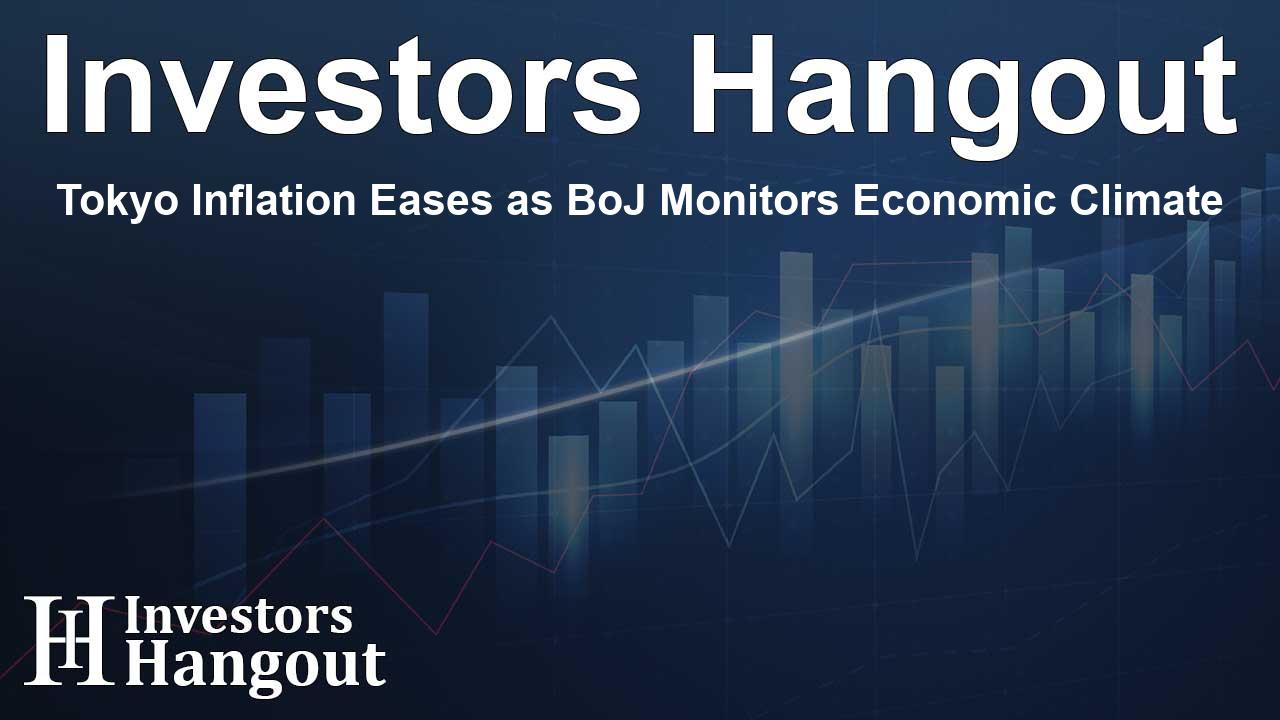Tokyo Inflation Eases as BoJ Monitors Economic Climate

Tokyo Inflation Trends and Market Responses
The Japanese yen experienced slight gains recently, and during the latest trading sessions, USD/JPY held steady at 144.57, representing a modest rise of 0.16% for the day. The currency fluctuations reflect broader economic trends and monetary policy decisions impacting both Japan and the global market.
Recent Developments in Tokyo's Core Inflation
The Core Consumer Price Index (CPI) in Tokyo revealed a surprising dip, decreasing to a three-month low of 3.1% year-over-year. This marked a notable decline from May's level of 3.6% and fell below market forecasts of 3.3%. The slowdown can be attributed to renewed government fuel subsidies and lowering water costs, which have significantly impacted consumer prices.
Even though this reduction in core inflation is noteworthy, the rate continues to exceed the Bank of Japan's (BoJ) target of 2%. This situation keeps anticipations alive for potential interest rate hikes in the latter part of the year. The Governor of the BoJ, Ueda, has indicated that rising wage growth is essential for maintaining inflation at target levels, and the bank will consider rate changes to achieve this objective.
Diverse Perspectives Within the BoJ
The latest BOJ Summary of Opinions revealed mixed sentiments among policymakers. While some members advocate for more aggressive monetary policy adjustments, others exhibit more dovish attitudes due to external economic pressures, particularly arising from ongoing global trade negotiations between Japan and the United States.
Specifically, Japan has firmly stated its position against proposed US tariffs of 25% on Japanese automobiles. The negotiations, which have led to numerous discussions over the past two months, have yet to yield a satisfactory resolution for both parties.
US Economic Indicators Influence Global Markets
In parallel, the Core Personal Consumption Expenditures (PCE) Price Index, regarded as the Federal Reserve's preferred gauge for inflation, has shown an unexpected acceleration. The index increased by 2.7% year-over-year in May, up from a revised 2.6% in April, against the market consensus of 2.6%. On a month-to-month basis, the index recorded a rise of 0.2%, surpassing the anticipated 0.1%.
This development marks a three-month peak and could strengthen the argument for the Fed to maintain current interest rates during its forthcoming meeting in July. Such ongoing price pressures in the US economy play a pivotal role in how currency pairs like USD/JPY react in the financial markets, heightening investor scrutiny on economic indicators.
Implications for Currency Traders
The fluctuations of the Japanese yen, influenced by both domestic inflation metrics and external economic pressures, signal the complexities traders face in the current market landscape. As key economic indicators continue to unfold, market participants will closely monitor both the BoJ’s and the Fed’s actions, which could potentially shape the trajectory of the USD/JPY currency pair.
Frequently Asked Questions
What caused the recent dip in Tokyo's core CPI?
The recent dip in Tokyo's core Consumer Price Index was largely driven by renewed fuel subsidies and reduced water charges, leading to lower inflation rates.
How does the BoJ plan to react to rising inflation?
The BoJ plans to consider raising interest rates only if wage growth is sustained and inflation reaches their 2% target consistently.
What are the implications of US economic indicators on the yen?
The US economic indicators, particularly inflation metrics like the Core PCE Price Index, can impact investor sentiment and currency valuations, including the yen.
How has the BoJ's current stance differed among its members?
There are mixed views among BoJ members, with some favoring aggressive rate hikes while others advocate for a more cautious approach due to global economic uncertainties.
Why are US-Japan trade negotiations important for the yen?
US-Japan trade negotiations are crucial as tariffs on Japanese goods could adversely affect trade balances, investor sentiment, and the value of the yen in global markets.
About The Author
Contact Hannah Lewis privately here. Or send an email with ATTN: Hannah Lewis as the subject to contact@investorshangout.com.
About Investors Hangout
Investors Hangout is a leading online stock forum for financial discussion and learning, offering a wide range of free tools and resources. It draws in traders of all levels, who exchange market knowledge, investigate trading tactics, and keep an eye on industry developments in real time. Featuring financial articles, stock message boards, quotes, charts, company profiles, and live news updates. Through cooperative learning and a wealth of informational resources, it helps users from novices creating their first portfolios to experts honing their techniques. Join Investors Hangout today: https://investorshangout.com/
The content of this article is based on factual, publicly available information and does not represent legal, financial, or investment advice. Investors Hangout does not offer financial advice, and the author is not a licensed financial advisor. Consult a qualified advisor before making any financial or investment decisions based on this article. This article should not be considered advice to purchase, sell, or hold any securities or other investments. If any of the material provided here is inaccurate, please contact us for corrections.
